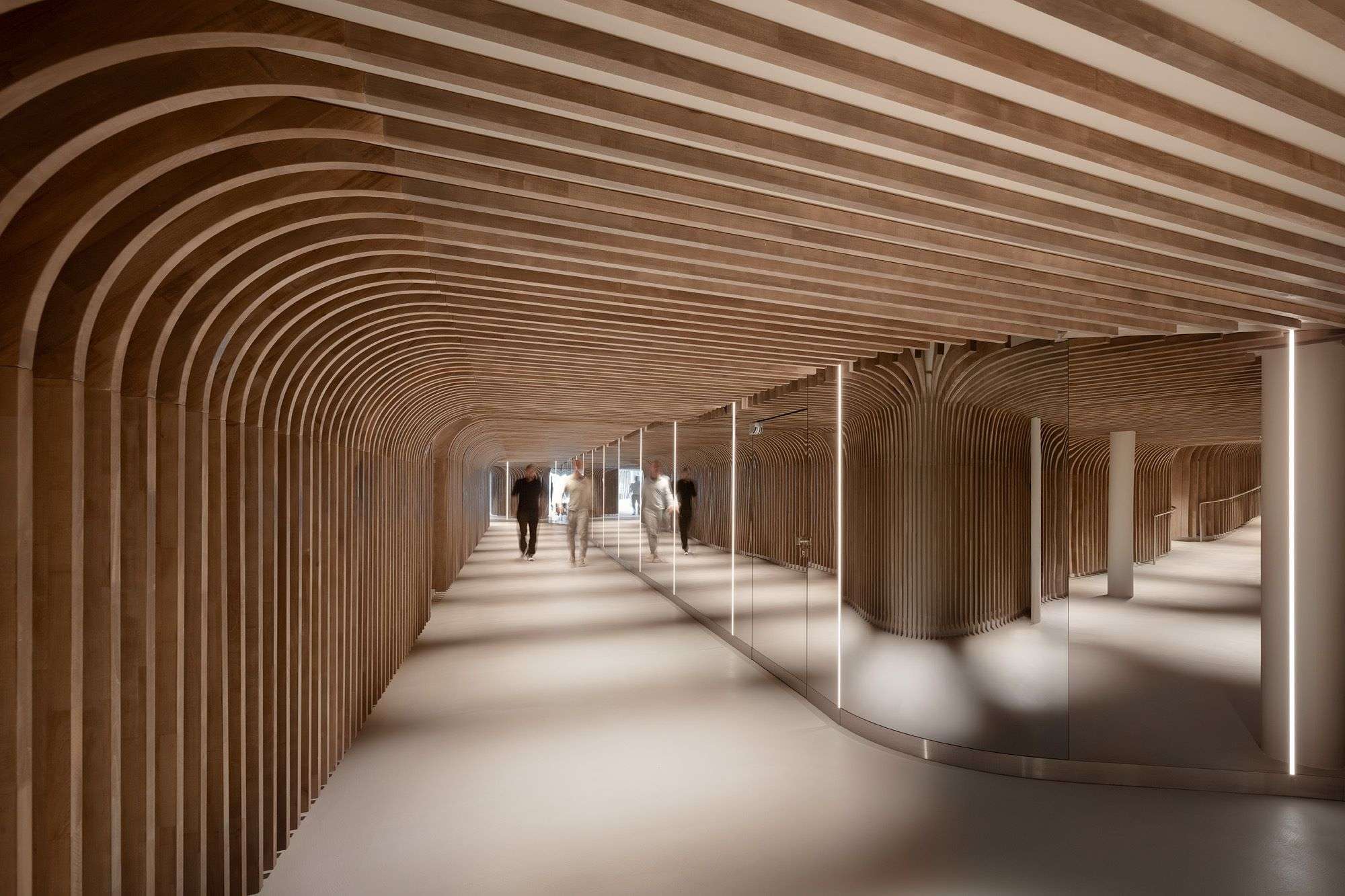Header: ATMOSPHERE by Krallerhof, HGEsch Photography.
Blending harmoniously into the surrounding Leoganger Steinberge mountain range, ATMOSPHERE by Krallerhof creates a year-round space for relaxation and regeneration. Designed by Hadi Teherani Architects, this adult-exclusive spa builds on the tradition of luxury accommodation at Hotel Krallerhof, a five-star retreat opened by the Altenberger family in 1956.
Winner of the Architectural Design of the Year at the BLT Built Design Awards, ATMOSPHERE showcases the power of sustainable materials in modern architecture. Its terraces, crafted from Kebony wood, embody the project’s dedication to blending beauty, functionality, and environmental responsibility.
In this interview, Marvin Uwe Grawe, Objects Consultant Architecture for Kebony, shares insights into the challenges of designing for an alpine environment and how the project sets a new standard for sustainable wellness design.
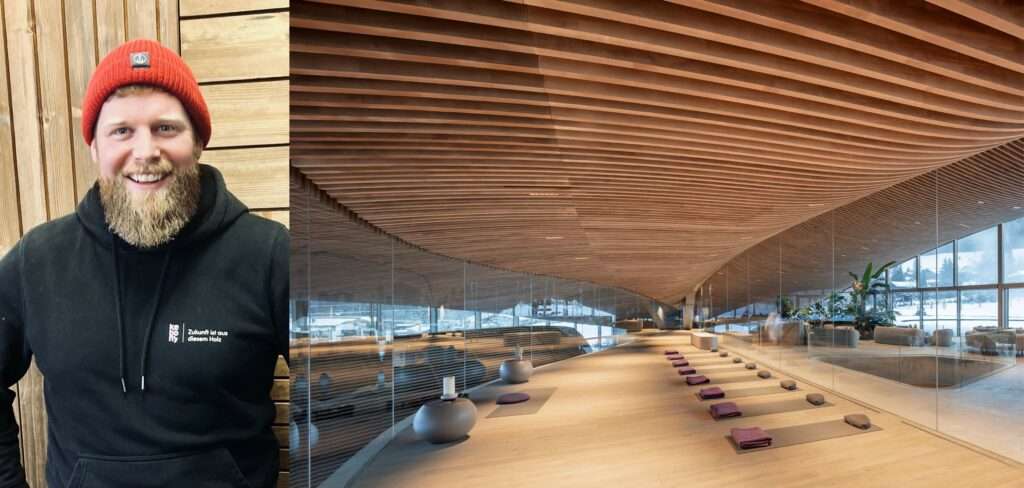
The terrace areas of ATMOSPHERE are a central element of its design. In your opinion, what makes Kebony wood the perfect choice for this award-winning space?
Kebony wood meets the high demands of modern architecture in terms of durability and aesthetics with exceptional results. Its warm, natural appearance complements ATMOSPHERE’s contemporary design while seamlessly blending into the alpine landscape.
Looking at the material requirements of ATMOSPHERE’s terrace, most outdoor pools are used during the hottest months when materials like stone and concrete can become uncomfortably hot and slippery, posing a risk of falls. A wooden pool deck offers a safer, more comfortable alternative, staying cooler under the sun and providing a soft, non-slip surface for walking by the water.
During the freezing months of Austria, however, the outdoor facilities at ATMOSPHERE come under different stresses, with sub-zero temperatures turning surface water to ice and putting the decking under conditions where other wooden materials may splinter and risk harm to guests.
In this context, a quality and unique decking solution was required; Kebony was perfectly placed to help fulfill these needs and the overarching vision for this world-leading project.
The terrace is exposed to constant moisture, sunlight, and even snow at times. How did you ensure that Kebony wood retains its quality and beauty in such a challenging environment?
Kebony’s bio-based Dual Modification™ technology permanently transformed the cell walls of the wood decking by forming locked-in furan polymers, increasing the dimensional stability, durability, and hardness of the wood. The reaction with OH-groups present in the wood reduces the water sensitivity significantly, making Kebony wood decking resistant to 24/7 exposure next to the pool and the seasonal vagrancies of the weather, therefore guaranteeing a high degree of safety.
The added resistance given by the dual modification™ process also means the Kebony decking requires little to no maintenance following installation, bypassing the need for any extended periods of ATMOSPHERE’s closure to treat the decking. For a project like ATMOSPHERE, this means the terrace remains durable under the harshest conditions while developing an elegant silver-grey patina over time, creating aesthetic harmony with the alpine surroundings.
What unique challenges or surprises did Kebony face while working on ATMOSPHERE, and how did you address them?
The greatest challenge was the extreme weather conditions of the alpine location. The material needed to endure harsh climatic stress while also meeting the project’s modern and sophisticated design requirements. To achieve this, we conducted material testing on-site and collaborated closely with Hadi Teherani Architects to identify the best technical and aesthetic solutions. Kebony’s flexibility and versatility allowed us to create a solution that is both functional and visually compelling, even in the most demanding conditions.
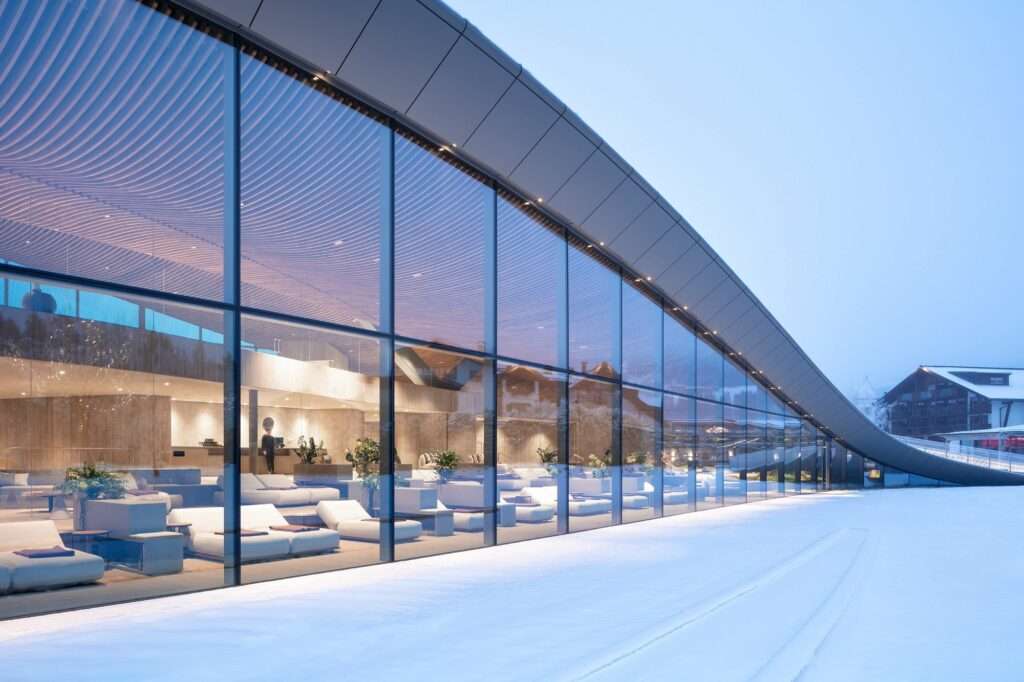
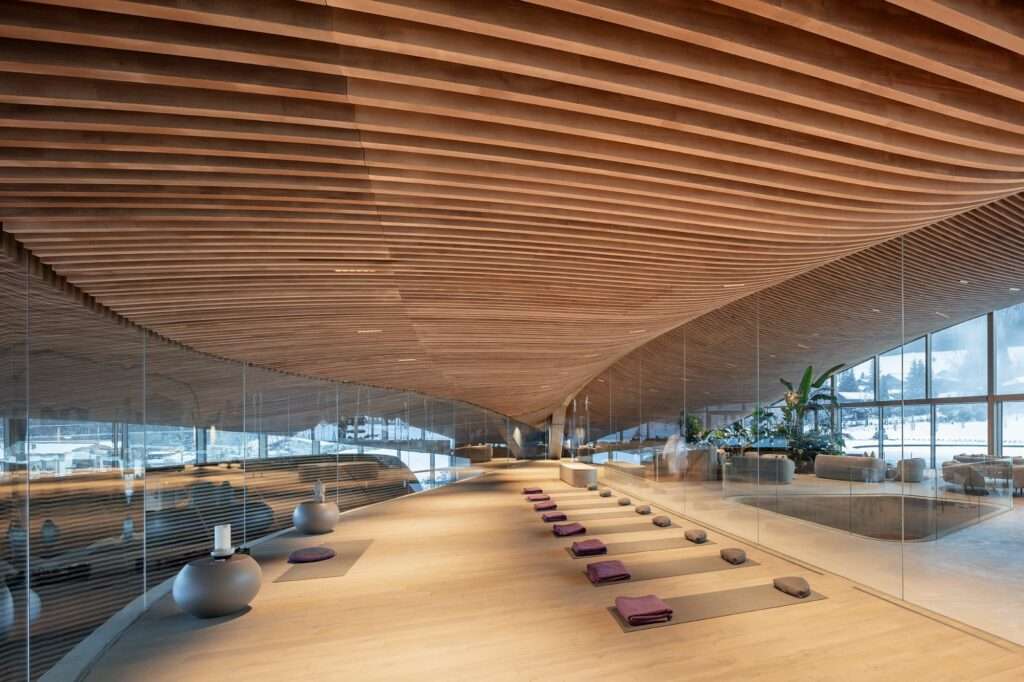
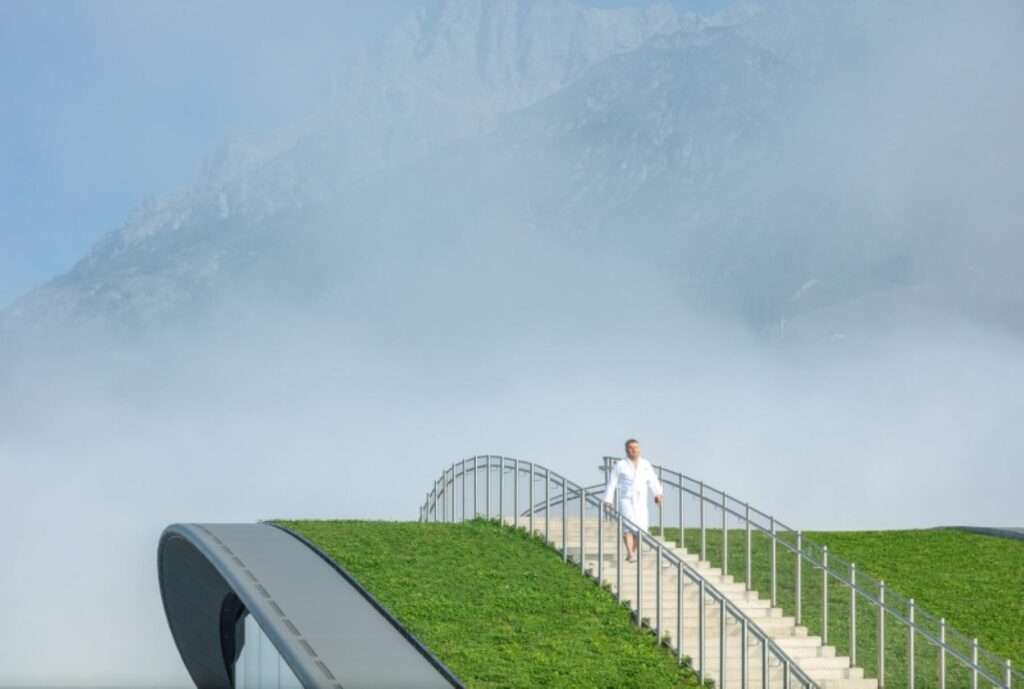
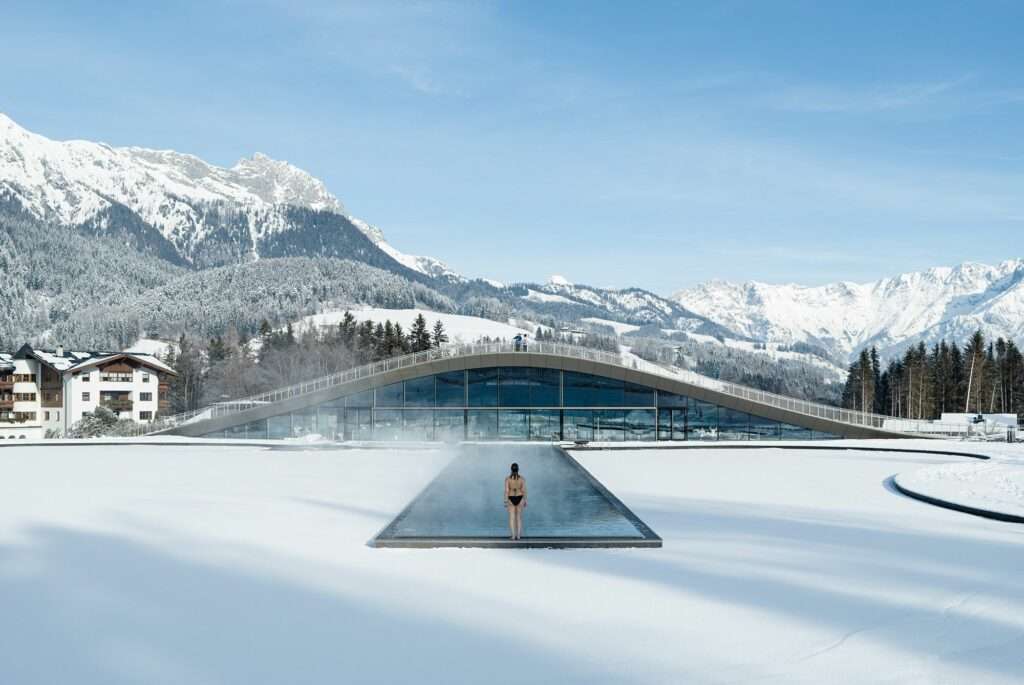
The spa is set against the stunning backdrop of the Leoganger Steinberge. How did Kebony ensure that the terrace harmonizes with this landscape?
Kebony wood is valued by architects for its ability to appear as a natural extension of its surroundings. Its capacity to age into an elegant silver-grey patina allows it to blend seamlessly into the alpine setting. For projects like ATMOSPHERE and other large-scale Kebony projects in snowy regions, such as the Lillehammer Winter Youth Olympic Games student village, the wood achieves the perfect balance between architectural elegance and natural beauty without overshadowing the environment—offering architects the freedom to harmonize architecture and landscape. These properties made Kebony the ideal material for ATMOSPHERE to seamlessly blend with the Leoganger Steinberge mountains, as the peaks both rise over ATMOSPHERE and reflect off the water’s surface.
How has Kebony’s technology and material sourcing contributed to reducing the environmental impact of this project?
Kebony is a pioneer in paving the way for healthy architecture and a greener, more sustainable future for the global construction industry. Developed to address the dual issue of deforestation and carbon emissions in construction, Kebony’s dual modification™ technology transforms sustainably sourced FSC-certified softwoods into durable and aesthetically beautiful timber products with the same, and in some cases superior, properties as endangered tropical hardwood species. This supply of environmentally friendly building materials that match quality with sustainability helps to alleviate the deforestation of the planet’s precious rainforest habitats and carbon sinks, such as the Amazon.
Additionally, Kebony’s versatility extends beyond terraces to façades, urban furniture, and even interiors. This adaptability enables architects to incorporate sustainable materials across various applications, making a meaningful contribution to eco-conscious architecture.
Hadi Teherani Architects worked alongside Kebony on the design of ATMOSPHERE. How did this collaboration influence the final result?
It is through the exciting collaboration with Hadi Teherani Architects that we are proud to see the Kebony decking on one of the largest scales of any project in the world. The collaboration was an outstanding example of how innovation and partnership can achieve remarkable outcomes.
What we found particularly remarkable about this project was that sustainability wasn’t just an empty buzzword but a genuine priority from start to finish. The architect’s vision required a material that was not only technically advanced but also supported the aesthetic of a modern spa in an alpine setting.
As Kebony’s architectural advisor, I (Marvin) worked closely with the team to ensure our materials were seamlessly integrated into the design. The result is a space where architecture, nature, and sustainability come together perfectly—a testament to the importance of early collaboration between architects and material experts.
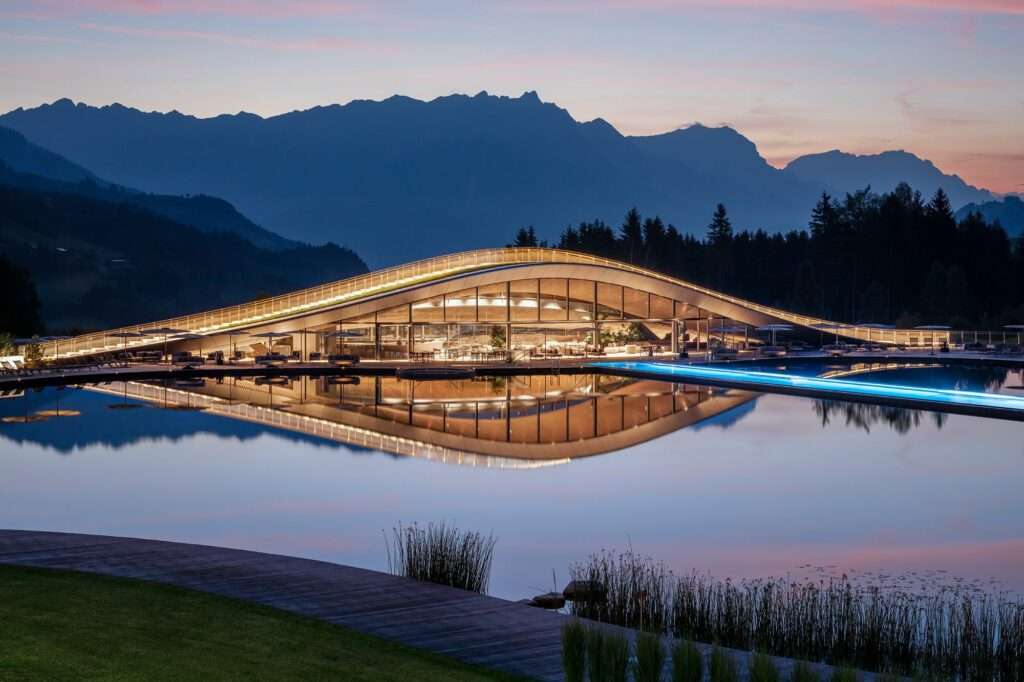
Congratulations on winning the BLT Award for “Architectural Design of the Year”! Do you believe this recognition will open new opportunities for Kebony in the wellness and hospitality industry?
Thank you! This award underscores the significance of sustainable materials like Kebony in the architecture of the future—especially in the premium wellness and hospitality sectors. It serves as an encouragement for architects to utilize Kebony in projects that combine durability, sustainability, and aesthetics.
With the growing appearance of new, luxury wellness facilities worldwide built to take advantage of the calming beauty of nature, Kebony wood’s effortless ability to blend in with spectacular natural landscapes positions it as the perfect material for further high-end wellness and hospitality projects across the globe.
What lessons has Kebony learned from this project, and how might these influence your approach to future projects?
ATMOSPHERE highlighted the importance of involving architects early in the material selection process to fully support their design vision. The close collaboration with Hadi Teherani Architects demonstrated that Kebony is ideal, not just for terraces but also for façades, urban furniture, and interiors—areas where design and sustainability must work hand in hand.
For future projects, we will leverage these insights to make Kebony even more adaptable and purpose-driven. We look forward to continuing to provide architects with innovative, sustainable solutions that bring their creative concepts to life.






